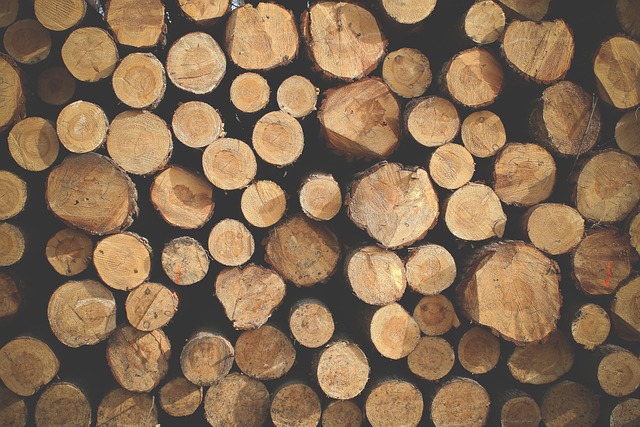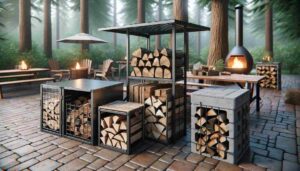Hey there! Have you ever wondered if cottonwood is a good option for firewood? Well, I was curious about it too, and I’ve done some digging to find out the truth.
Yes, cottonwood can be used as firewood, but it has a higher moisture content and burns relatively quickly. It’s best used for quick ignition and smaller spaces, but it may require mixing with denser hardwoods for longer-lasting fires.
But this isn’t the whole picture. In this guide, I’ll share my personal experience and all the details you need to know about using cottonwood as firewood. I’ll explore its properties, advantages, considerations, and even alternative uses. So, let’s dive in and uncover whether cottonwood is a suitable choice for your fireplace or wood stove. Let’s get started!
Understanding Cottonwood as a Firewood Option
When I talk about cottonwood as firewood, it’s essential to understand the tree itself. Cottonwood trees are known for their tall stature and broad leaves. They are commonly found in certain regions, such as North America, Europe, and Asia. The trees have a distinct cotton-like substance that accompanies their seeds, hence the name “cottonwood.”
- Properties of Cottonwood as Firewood: Now, let’s discuss the properties of cottonwood that make it suitable or not-so-suitable for burning.
- Moisture Content and Drying Time: One key consideration when choosing firewood is its moisture content. Cottonwood logs tend to have a higher moisture content compared to other hardwoods. This means they may take longer to dry and require proper seasoning before use. It’s crucial to give cottonwood enough time to dry thoroughly to ensure efficient burning.
- Density and Weight: Cottonwood has a lower density compared to hardwoods like oak or maple. This characteristic affects its burn rate and heat output. The lower density of cottonwood can result in quicker burning and relatively faster consumption of logs.
- BTU (British Thermal Unit) Value: The BTU value measures the heat energy produced by a specific type of firewood. While cottonwood may not have the highest BTU value compared to other hardwoods, it still provides a reasonable amount of heat. It can be suitable for smaller spaces or as supplementary heating in conjunction with other hardwoods.
Advantages of Burning Cottonwood: Despite the considerations I just discussed, cottonwood does offer some advantages when used as firewood. Let’s explore them.
- Quick and Easy Ignition: Cottonwood logs ignite easily due to their lower density and moisture content. They catch fire quickly, making them an excellent choice for starting fires in your fireplace or wood stove. If you value convenience and want a firewood option that gets your fire going swiftly, cottonwood might be a good fit for you.
- Good Heat Output: Although cottonwood may not provide the same level of heat output as dense hardwoods, it still generates a decent amount of warmth. This makes it suitable for smaller spaces or situations where you need a quick burst of heat. You can always combine cottonwood with denser firewood to create a longer-lasting fire.
- Availability and Cost: Cottonwood is often abundant in certain regions, making it a readily available firewood option. This availability can make it more cost-effective compared to hardwoods that may be less prevalent in your area. If you can easily source cottonwood logs, it can be a budget-friendly choice for your heating needs.
In the next section, I’ll delve into some considerations you should keep in mind when burning cottonwood. Stay tuned!
Advantages of Burning Cottonwood
Now that you’ve explored the properties of cottonwood as firewood, let’s take a closer look at the advantages it offers:
- Quick and Easy Ignition: One of the significant benefits of using cottonwood as firewood is its ability to ignite quickly. Thanks to its lower density and moisture content, cottonwood logs catch fire easily. You won’t have to struggle to get your fire started, saving you time and effort.
- Good Heat Output: While cottonwood may not match the heat output of denser hardwoods, it still generates a decent amount of warmth. It can be particularly suitable for smaller spaces or as supplementary heating. If you need a quick burst of heat or want to warm up a cozy corner of your home, cottonwood can do the job.
- Availability and Cost-Effectiveness: Cottonwood trees are often abundant in certain regions, making cottonwood logs readily available. This accessibility can make it a cost-effective firewood option. Since it’s more plentiful, the price of cottonwood logs may be lower compared to scarce hardwoods, allowing you to save some money on your heating expenses.
- Versatility for Outdoor Use: Besides indoor heating, cottonwood can also be a great choice for outdoor fire pits and campfires. Its quick ignition properties make it convenient for starting fires in the great outdoors. Whether you’re enjoying a camping trip or a backyard bonfire, cottonwood can help create a warm and cozy atmosphere.
Remember, while cottonwood has its advantages, it’s crucial to consider your specific heating needs and circumstances.
Considerations When Burning Cottonwood
As with any firewood, there are certain considerations you should keep in mind when burning cottonwood. Let’s take a closer look:
- High Moisture Content: One of the primary considerations with cottonwood is its higher moisture content compared to other hardwoods. Green or unseasoned cottonwood logs contain a significant amount of water, which can hinder efficient burning. It’s crucial to properly season and dry cottonwood logs to reduce their moisture content. This process typically takes several months, allowing the logs to reach an optimal moisture level for efficient combustion.
- Fast Burning and Quick Consumption: Due to its lower density, cottonwood tends to burn relatively faster compared to denser hardwoods. This means that cottonwood logs may be consumed more quickly, requiring more frequent fuel additions to sustain the fire. If you’re looking for a firewood option that burns for longer periods, it’s advisable to mix cottonwood with denser hardwoods to create a more balanced burn rate.
- Potential for Increased Creosote Buildup: Burning cottonwood can contribute to the buildup of creosote in your chimney. Creosote is a black, sticky substance that can accumulate in the chimney flue and pose a fire hazard if not regularly cleaned. The relatively faster burn rate of cottonwood, combined with its higher moisture content, can contribute to increased creosote formation. It’s essential to schedule regular chimney maintenance and cleaning to prevent the risk of chimney fires.
Alternative Uses for Cottonwood
While cottonwood may not be the top choice for primary indoor heating, it has various alternative uses that you can explore. Let’s take a look:
- Outdoor Fire Pits and Campfires: Cottonwood’s quick ignition properties make it an excellent option for outdoor fire pits and campfires. Whether you’re gathering with friends and family in your backyard or going on a camping adventure, cottonwood can help create a cozy and inviting atmosphere. Its ability to catch fire easily means you’ll spend less time trying to get the flames going and more time enjoying the warmth and ambiance of the fire.
- Kindling and Starter Logs: Cottonwood can serve as fantastic kindling or starter logs to ignite larger hardwoods. Its quick-burning nature makes it an efficient fire starter, ideal for getting your wood stove or fireplace up and running. By using cottonwood as kindling, you can easily ignite denser hardwoods that provide longer burning times and sustained heat. It’s a great way to make use of cottonwood’s quick ignition properties while enjoying the longer-lasting warmth of other firewood options.
- Crafting and Woodworking: Cottonwood can be a valuable wood for crafting and woodworking projects. Its relatively soft and workable nature makes it suitable for carving, making small wooden crafts, or even creating intricate designs. If you have a knack for woodworking or enjoy DIY projects, cottonwood can be a versatile material to work with.
- Wildlife Habitat and Conservation: Cottonwood trees play a vital role in wildlife habitat and conservation efforts. These trees provide nesting sites for birds, food sources for insects and animals, and contribute to overall ecosystem health. If you have cottonwood trees on your property, preserving them can support local wildlife populations and contribute to the ecological balance of your area.
Remember, while cottonwood may not be the ideal choice for primary indoor heating, it can still serve various purposes.
Is cottonwood better than oak for firewood?
No, oak is generally considered a better firewood option compared to cottonwood. Here’s why:
- Density and Heat Output: Oak has a higher density than cottonwood, which means it burns slower and produces more sustained heat. The denser wood of oak allows it to provide a longer-lasting fire and better heat output compared to cottonwood.
- Lower Moisture Content: Oak typically has a lower moisture content than cottonwood, making it easier to ignite and burn more efficiently. Cottonwood, on the other hand, has a higher moisture content, which can lead to increased smoke production and reduced heat output.
- Longer Burn Time: Due to its higher density and lower moisture content, oak logs burn for a longer duration compared to cottonwood. This means you will need to add fewer logs and have a more consistent heat source when using oak as firewood.
- Coaling Properties: Oak produces a good amount of long-lasting coals, which are ideal for maintaining a fire overnight or for extended periods. These coals provide a steady source of heat and make it easier to reignite the fire in the morning. Cottonwood, with its faster burn rate, may not produce as substantial or long-lasting coals.
- Versatility: Oak is a versatile firewood that is suitable for a wide range of heating applications, including wood stoves, fireplaces, and outdoor fire pits. Its excellent burning properties and heat output make it a preferred choice for many.
While cottonwood may have advantages such as quick ignition and cost-effectiveness, oak is generally considered superior to firewood due to its higher density, lower moisture content, longer burn time, and better coaling properties.
FAQs
Here are some frequently asked questions (FAQs) related to cottonwood as firewood:
Q: Can I burn cottonwood without seasoning or drying it?
A: It’s not recommended. Cottonwood has a higher moisture content, so proper seasoning is essential for efficient burning. Allowing the logs to dry for several months will help reduce moisture and improve combustion.
Q: How long does it take to season cottonwood?
A: Cottonwood typically takes about 6 to 12 months to properly season. This timeframe allows the logs to reach an optimal moisture level for more efficient burning.
Q: Can I burn cottonwood in a wood stove or fireplace insert?
A: Yes, you can burn cottonwood in a wood stove or fireplace insert. However, due to its faster burn rate, it’s advisable to mix cottonwood with denser hardwoods for longer-lasting fires and sustained heat output.
Q: Does cottonwood produce a lot of sparks or popping?
A: Cottonwood can produce more sparks and popping compared to some other hardwoods. It’s recommended to use a fire screen or spark guard to prevent any potential sparks from reaching flammable surfaces.
Q: Can cottonwood be used for cooking or smoking food?
A: It’s generally not recommended to use cottonwood for cooking or smoking food. The wood’s fast burn rate and potential for increased creosote buildup make it less suitable for these purposes. Opt for hardwoods like oak or fruitwood for cooking or smoking.
Q: Is cottonwood safe to burn in an indoor fireplace or wood stove?
A: Cottonwood is safe to burn in an indoor fireplace or wood stove when properly seasoned and used in conjunction with other hardwoods. However, regular maintenance and chimney cleaning are crucial to prevent creosote buildup and ensure safety.
Q: Is cottonwood worth burning?
A: Cottonwood can be worth burning as firewood, but there are factors to consider. It ignites easily, provides decent heat output, and can be cost-effective due to its regional abundance. However, its higher moisture content and faster burn rate may require proper seasoning and mixing with other hardwoods for sustained fires. Evaluate your specific needs, availability, and consider the trade-offs before deciding if cottonwood is worth burning for your situation.
Q: Where can I find cottonwood for firewood?
A: Cottonwood trees are commonly found in certain regions, particularly near rivers, streams, and wetland areas. Local firewood suppliers, tree removal services, or online platforms may be good sources to find cottonwood logs.
Remember, it’s always important to exercise caution, follow safety guidelines, and consider local regulations when using any type of firewood.
Conclusion
In conclusion, cottonwood can be a viable firewood option, but it’s important to consider its properties and specific characteristics. Its quick ignition, good heat output, availability, and cost-effectiveness are definite advantages. However, you should also be mindful of its higher moisture content, faster burn rate, and potential for increased creosote buildup.
While cottonwood may not be the go-to firewood for indoor heating, it has alternative uses that you can explore. From outdoor fires and campfires to kindling and starter logs, crafting, and even supporting wildlife habitats, cottonwood can find its place in your activities and projects.
Ultimately, the suitability of cottonwood as firewood depends on your individual needs, regional availability, and safety precautions. By understanding these factors and making informed choices, you can enjoy the warmth and ambiance of a well-tended fire with cottonwood logs. Stay warm and cozy!










